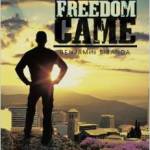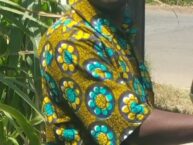 The reader of this book might as well begin with the following question: how could a boy brought up by his God-fearing grandparents forsake all their teachings in favor of swimming with ZANU PF sharks in Harare? It is a question that finds various responses in the whole book. It is a book that tells the unfortunate personal journey of Godknows and that of many Zimbabweans since independence in 1980. It is a story that forms part of the personal genre of literature in post-colonial Africa as Africans struggle with the political, economic and social collapse of many countries from the day they each got their independence from the British, French, Spanish, and Portuguese. There is a central theme in almost all of independent Sub-Saharan Africa. Few leaders, if any, can claim to have left their citizens better off than they found them at independence. The writer weaves together themes about the lack of equal access to economic freedom to the majority, the rise in homelessness among children, the rise in corruption, the politicization of all institutions, the decay of the economy, inter-ethnic issues in relationships and marriage, infidelity, and surprisingly, the existence of a few good people amidst the rot.
The reader of this book might as well begin with the following question: how could a boy brought up by his God-fearing grandparents forsake all their teachings in favor of swimming with ZANU PF sharks in Harare? It is a question that finds various responses in the whole book. It is a book that tells the unfortunate personal journey of Godknows and that of many Zimbabweans since independence in 1980. It is a story that forms part of the personal genre of literature in post-colonial Africa as Africans struggle with the political, economic and social collapse of many countries from the day they each got their independence from the British, French, Spanish, and Portuguese. There is a central theme in almost all of independent Sub-Saharan Africa. Few leaders, if any, can claim to have left their citizens better off than they found them at independence. The writer weaves together themes about the lack of equal access to economic freedom to the majority, the rise in homelessness among children, the rise in corruption, the politicization of all institutions, the decay of the economy, inter-ethnic issues in relationships and marriage, infidelity, and surprisingly, the existence of a few good people amidst the rot.
Unlike their counterparts in Europe, Africans in the pre-independence period had high ideals about their countries to such an extent that they did not bother to read the history and developments in African countries that had achieved political independence. If they had bothered to do, then Godknows would not have been surprised when his British friends asked him the question: “Why do you want to go back to Africa? Your country will just go the way of other independent African countries and you will regret going back.” Although Godknows’s father had never studied or lived abroad, he had tried to express similar sentiments when Godknows returned to his hometown, Bulawayo. “You see, my son, these people (ZANU) are not interested in your education. They have made promises to themselves and to the fighting boys that they will get first preference in any senior posts in government.” If only Godknows had equipped himself with reading the history of multi-ethnic societies in post-independence, he would have appreciated the old man’s deep observations. Post-independence Africa is ruled by majority ethnic groups to the total exclusion of other ethnic groups, and if that group ceases to be popular, they simply rule by brutal oppression. With political power, comes liberation economics – rewards tend to be corruptly channeled only to the members of that ethnic group or ZANU party members. That said, Godknows working the thoroughly corrupt Bill Chiipe, did not appreciate that he was being allowed into the ZANU circle or specifically into the Zezuru clan as a useful token since he was clearly a Ndebele chap from Bulawayo. It was against this naivety that he quickly, though reluctant at first, appreciated “the perks of working in the civil service” after arriving in Harare. The ever-conniving Bill had made sure to buy a ZANU card for Godknows without his knowledge. Bill knew that the only way Godknows would be allowed to the feeding trough was if he were a card-carrying ZANU member. Poor guy did not know this until the Minister made it public at his wedding at the Sheraton Hotel!
Rachel, his Zambian girlfriend, who had seen how good Zambian civil servants had been converted to corruption had expressed horror when Bill Chiipe, the indigenous businessman initiated Godknows into corruption in the awarding of import licenses, medical equipment supplies, wheat contracts and eventually to maize contracts that resulted in his eventual downfall. Rachel stated: “It always starts innocently, a lunch, a bottle of wine at Christmas, and before you know it, they are wining and dining you sending you on holiday in Mauritius.” Godknows replied: “It won’t happen here. Zimbabweans are different.” If only Godknows had practiced the values taught to him by his grandparents and carefully listened to Rachel’s admonitions, he would have avoided jail time and avoided conviction for the abuse of grain contracts by Bill, the relevant minister, and the whole group of ZANU insiders who decided to sacrifice one person who did not belong.
When Rachel broke up the relationship with Godknows and returned to Zambia, her replacement was a girl, Consider, who only loved money and yet appreciated Godknows’s naivety because he understood that deep down, he was a good man. She quickly got pregnant, asked Godknows to pay lobola, organized a quick yet expensive wedding at the Sheraton, invited many of her family but few from his family, planned the wedding with very little input from the husband, and build a new house in Glen Lorne. The reader learns late in the book that Sam, the guy who was introduced as a friend, the guy who drove Consider to her aunt’s house in Budiriro was a CIO boyfriend who later moved to London with Consider and her son when Godknows was in jail. Could the son’s father be Sam?
The politics of exclusion of other ethnic groups from the feeding trough is deeply held in post-independence Africa. Bill, in complaining against White Rhodesians stated to Godknows: “And the Rhodesians completed fairly by excluding us out of the whole economic loop completely? —-. You argue like a white man, you dress like a white man; you even speak like a white man.” It is this syndrome that has undermined economic development in the whole of Africa. People who advance meritocracy rather than tribal affiliations, those who insist on government accountability and a respect for institutions are deemed to be white. These sentiments are the tragedy of Africa and can be seen in the resulting squalor and poverty long after the white man passed the baton to clearly repressive Africans. Bill’s comment is not lost or appreciated by the Korekore, Tongas, Vendas, some Karanga, Ndebeles, Sotho, Xhosas, the Kung, Nambiya, Ndaus, some Manyikas and other groups that have been shut out of the economic benefits by the Zezurus just as Africans were shut out by the whites in Rhodesia.
When Godknows was making marriage arrangements, we read very little about his family and everything about Consider’s family: the journey to Mhondoro for Rusambo, the visit to the aunt’s house in Budiriro, the cover up by the aunt for Consider’s unfaithfulness, the insistence on the big new house in Glen Lorne and not the house in Mount Pleasant, the shopping trip to London, and the wedding at the Sheraton. Even Bill, the corrupt mastermind who had introduced Godknows to Consider is heard saying to him: “It is not too late to walk away from this, you know.” Godknows ultimately answered: “You know you can be so unfeeling. Would you walk away if you were in my shoes”? These sentiments although naïve in the extreme reflect the good values Godknows had been taught by his grandparents. Poor chap, he is getting married to a woman who by all accounts values money more than love and is not beyond cheating on him before and after marriage – all aided by the aunt from Budiriro and her clan.
When he discovers that numbers do not add up in grain contracts with the GMB, he alerts Bill Chiipe, the corrupt one without an understanding that such people live for and with corruption in all government tenders. When Godknows found that his company had delivered less tons of maize but the government had paid for more tonnage, he immediately understood the directors (Godknows and Bill) of the company would be charged with fraud by the Economic Conduct Inspectorate as this would be reported to the police. Since all public institutions in Zimbabwe had over the past thirty-five years become ZANU institutions with the primacy of ZANU political structures trumping the legal system and everything else, only those considered to be outsiders would naturally take the fall for the scandal. Godknows unwittingly informs Bill of the details of the GMB grain contract scandal. When asked by Bill who could be responsible, Godknows mentioned it would have to be someone at the GMB working with someone in their office. When Godknows said it might be the Directors, Bill immediately stated: “No, not the directors, Goddie, one director. The one director who has put all system in place, the one director who understands all the logistics, negotiated the letters of credit with the banks, coordinated all the customs clearing….” He immediately understood that GMB people, the Minister, Bill and beneficiaries of tenders – all bona fide members had closed ranks and he would have to take the fall. He ends in jail, loses everything including Consider and the boy, access to the two houses and yet Rachel who had returned to Zambia and got married had a comforting letter at the end when he got out of prison. She wrote: “I pray that you have learnt what lessons need to be learnt from your experiences. Stay strong –and straight – and you will see how quickly you turn your life around.”
In When Freedom Came, Benjamin Sibanda tells a tragic story of Africans that were denied political and economic privileges by white Rhodesians and hence they were by and large a very poor lot at independence. In their attempts to amass wealth very quickly, ZANU, the group that won elections in 1980 sought to enrich their ethnic groups by crude but effective patronage. They robbed state coffers, natural resources, and minerals via membership in ZANU. Honorary ZANU members like Godknows did not belong to this group and he paid a heavy price by sacrificing the values taught him by his grandparents for instant gratification through corrupt practices without a clear understanding that when push comes shove, he would indeed be the sacrificial lamb.
The reader cannot but make the following connection. Godknows Kuzvida is none other than the author, Benjamin Sibanda. It is truly a book worth reading by everyone who is interested in how post-independent Zimbabwe has degenerated into a hunter-and-gatherer economy fueled by corruption, the lack of adherence to law, the politicization of all institutions, the practice of ethnic politics as state policy, and above all, much worse poverty for the majority after independence than before 1980. Books of the personal genre are a welcome insight into African countries and societies.
About the Reviewer
Smile Dube is a professor of Economics at California State University Sacramento, where he has worked since 1989. He is widely published in the field of economics, in journals such as The Journal of African Policy Studies, Journal of European Integration, Economia Internazionale (International Economics), and many others. He is widely read in world literature, with an unwavering interest in contemporary African literature.




1 comment for “Benjamin Sibanda’s ‘When Freedom Came’, Reviewed by S. Dube ”